Legal support is essential for media activists, as it empowers them to navigate the complex legal landscape surrounding their work. By accessing various resources, such as organizations and pro bono services, activists can safeguard their rights and receive expert guidance. This support not only minimizes legal risks but also enhances their credibility and effectiveness in advocating for important issues.
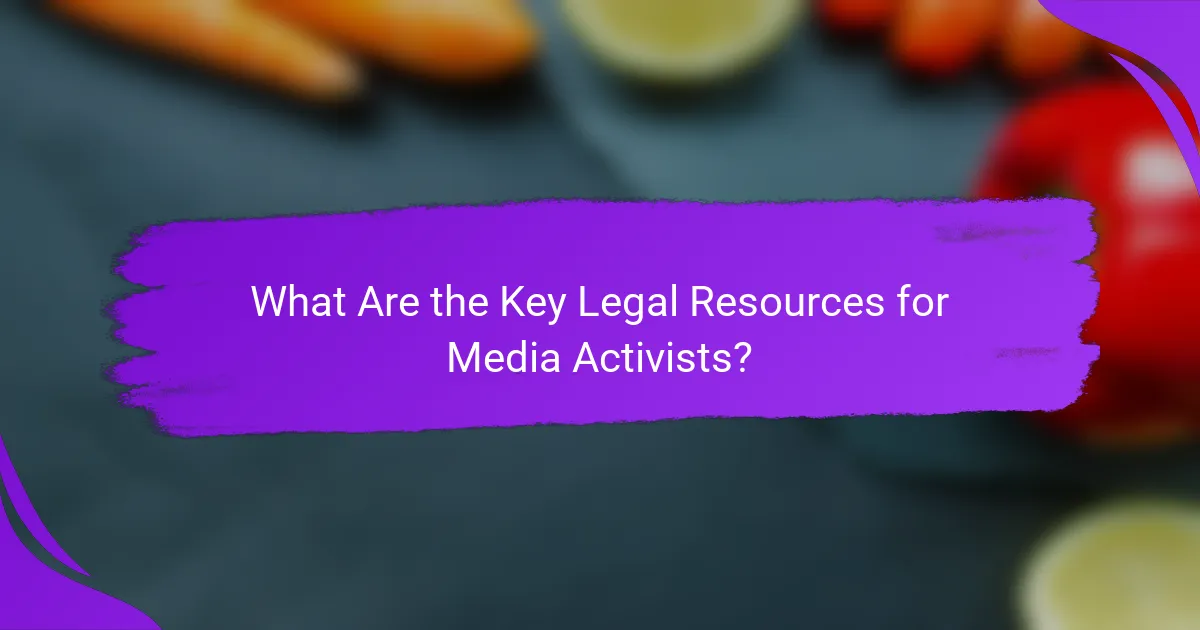
What Are the Key Legal Resources for Media Activists?
Media activists can access various legal resources to support their work, ensuring they understand their rights and obligations. These resources include organizations, online platforms, pro bono services, research tools, and government resources tailored to assist in legal matters relevant to media activities.
Legal Aid Organizations
Legal aid organizations provide essential support for media activists, offering legal advice, representation, and resources. These organizations often focus on civil rights, freedom of expression, and media law, helping activists navigate complex legal landscapes.
Examples of such organizations include the American Civil Liberties Union (ACLU) and the Media Law Resource Center (MLRC). Activists should seek out local legal aid groups that specialize in media-related issues for tailored assistance.
Online Legal Platforms
Online legal platforms offer accessible resources for media activists, including legal templates, guides, and forums for discussion. Websites like LegalZoom and Rocket Lawyer provide tools to help activists understand their legal rights and responsibilities.
These platforms often include FAQs and community support, making it easier for activists to find specific information related to their legal needs without incurring high costs.
Pro Bono Services
Pro bono services are legal services provided free of charge by attorneys and law firms to support media activists. Many law firms have programs dedicated to assisting non-profits and activists, ensuring they have access to quality legal representation.
Activists should actively seek out local law firms that offer pro bono services, as these can significantly reduce legal costs while providing expert guidance on complex issues.
Legal Research Tools
Legal research tools are vital for media activists to stay informed about laws and regulations affecting their work. Resources like Westlaw and LexisNexis offer comprehensive databases of legal information, case law, and statutes.
Many universities and public libraries provide access to these tools, allowing activists to conduct thorough research without significant financial investment.
Government Resources
Government resources provide valuable information regarding media laws and regulations. Websites of government agencies, such as the Federal Communications Commission (FCC) in the U.S. or equivalent bodies in other countries, often contain guidelines and legal frameworks relevant to media activities.
Activists should familiarize themselves with these resources to ensure compliance with local laws and to understand their rights under various regulations.
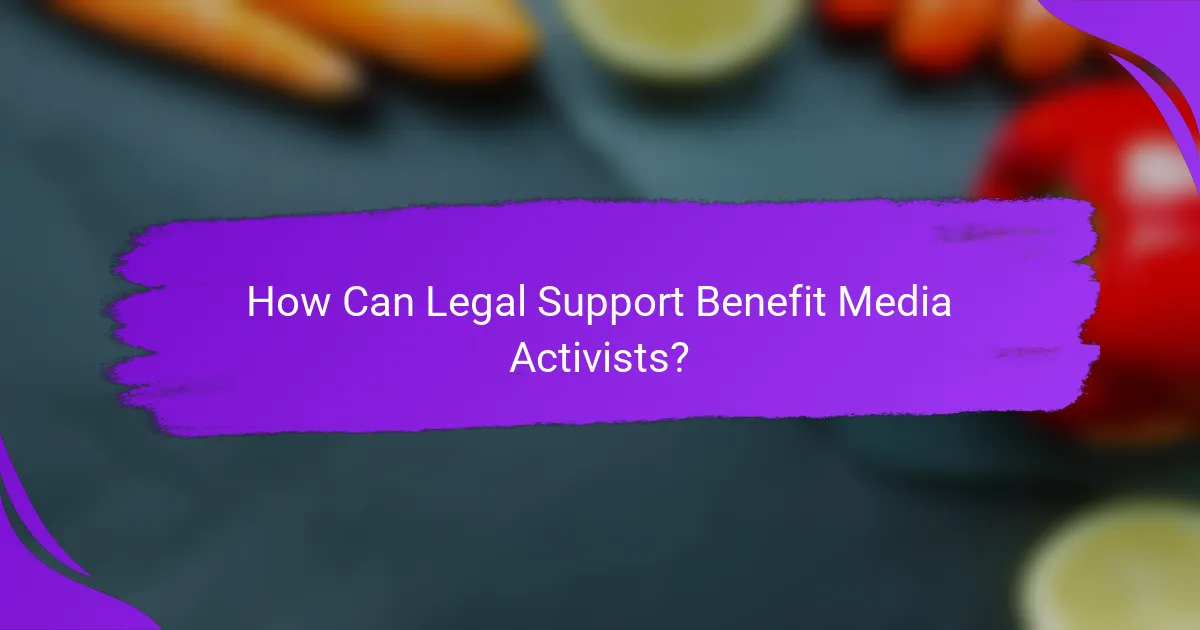
How Can Legal Support Benefit Media Activists?
Legal support can significantly benefit media activists by safeguarding their rights, providing expert guidance, and minimizing risks associated with their work. Access to legal resources enhances their ability to operate effectively and credibly in a challenging environment.
Protection of Rights
Legal support ensures that media activists can defend their rights, such as freedom of speech and press. This protection is crucial in environments where censorship or legal repercussions are common.
Activists can rely on legal counsel to navigate complex laws and regulations, helping them understand their rights under local and international frameworks. This knowledge empowers them to challenge unjust practices and assert their legal protections.
Access to Expertise
Having access to legal experts allows media activists to benefit from specialized knowledge regarding media law, intellectual property, and defamation. This expertise is vital for understanding the legal landscape and making informed decisions.
Legal professionals can provide training sessions or workshops, equipping activists with essential skills to handle potential legal challenges. This proactive approach can prevent legal issues from escalating and ensure compliance with relevant laws.
Risk Mitigation
Legal support helps media activists identify and mitigate risks associated with their activities. By understanding potential legal pitfalls, activists can take steps to protect themselves and their organizations.
For example, legal advisors can assist in drafting contracts or agreements that clarify rights and responsibilities, reducing the likelihood of disputes. Additionally, they can offer strategies for safely gathering and disseminating information, particularly in sensitive contexts.
Enhanced Credibility
Engaging legal support enhances the credibility of media activists in the eyes of the public and stakeholders. It demonstrates a commitment to ethical practices and adherence to the law, which can build trust with audiences.
Moreover, having legal backing can deter potential adversaries from attempting to intimidate or silence activists. This assurance can empower activists to pursue their missions more confidently, knowing they have the legal resources to support their efforts.
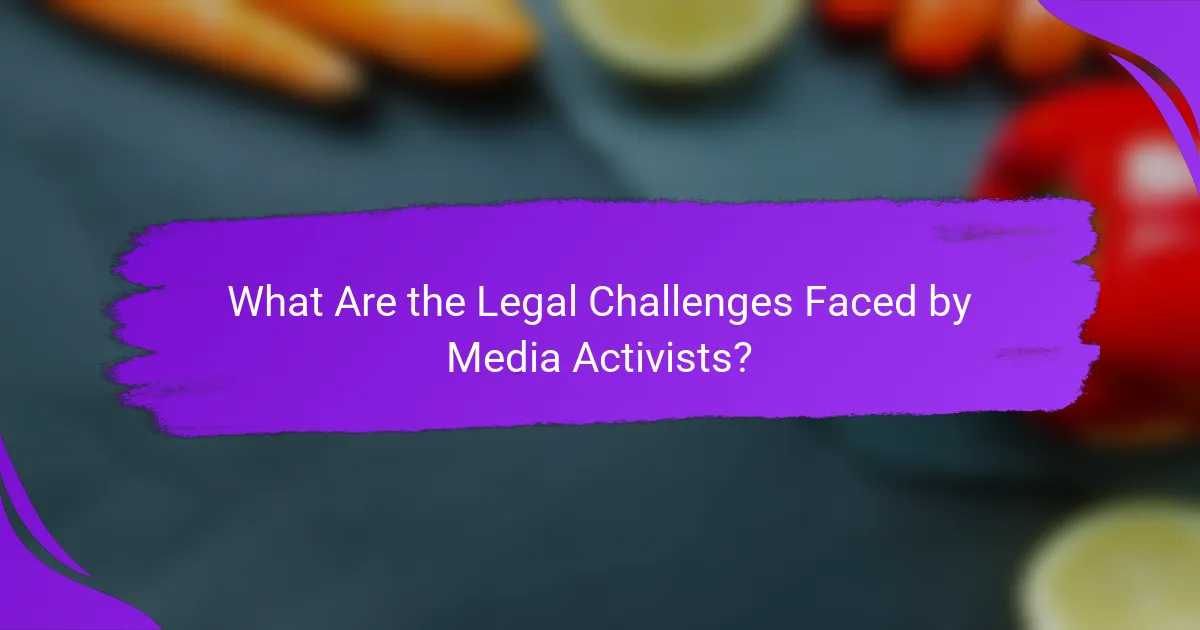
What Are the Legal Challenges Faced by Media Activists?
Media activists often encounter various legal challenges that can hinder their work, including defamation lawsuits, copyright issues, and privacy violations. Understanding these challenges is crucial for navigating the legal landscape effectively.
Defamation Lawsuits
Defamation lawsuits arise when an individual or organization claims that false statements have harmed their reputation. Media activists must be cautious about the accuracy of their reporting to avoid potential legal repercussions.
To mitigate risks, activists should verify facts and consider the context of their statements. In many jurisdictions, truth is a defense against defamation claims, but proving it can be costly and time-consuming.
Common pitfalls include making unverified allegations or failing to provide sufficient evidence for claims. It’s advisable to consult legal experts when in doubt about potentially defamatory content.
Copyright Issues
Copyright issues can pose significant challenges for media activists, especially when using third-party content. Unauthorized use of copyrighted material can lead to legal action, including demands for damages or injunctions.
Activists should familiarize themselves with copyright laws and consider using content that is either in the public domain or licensed under Creative Commons. Fair use provisions may apply, but they can be complex and context-dependent.
To avoid infringement, always credit original creators and seek permission when necessary. Keeping track of sources and licenses can help prevent legal disputes.
Privacy Violations
Privacy violations occur when personal information is disclosed without consent, which can be a significant concern for media activists. This includes unauthorized surveillance or sharing sensitive information about individuals.
To protect themselves, activists should understand privacy laws relevant to their jurisdiction and obtain consent before publishing personal data. Familiarity with regulations like the General Data Protection Regulation (GDPR) in Europe is essential.
Activists should also be aware of the implications of whistleblower protections, which can offer some legal cover when exposing wrongdoing. However, balancing the public interest with individual privacy rights is crucial to avoid legal repercussions.
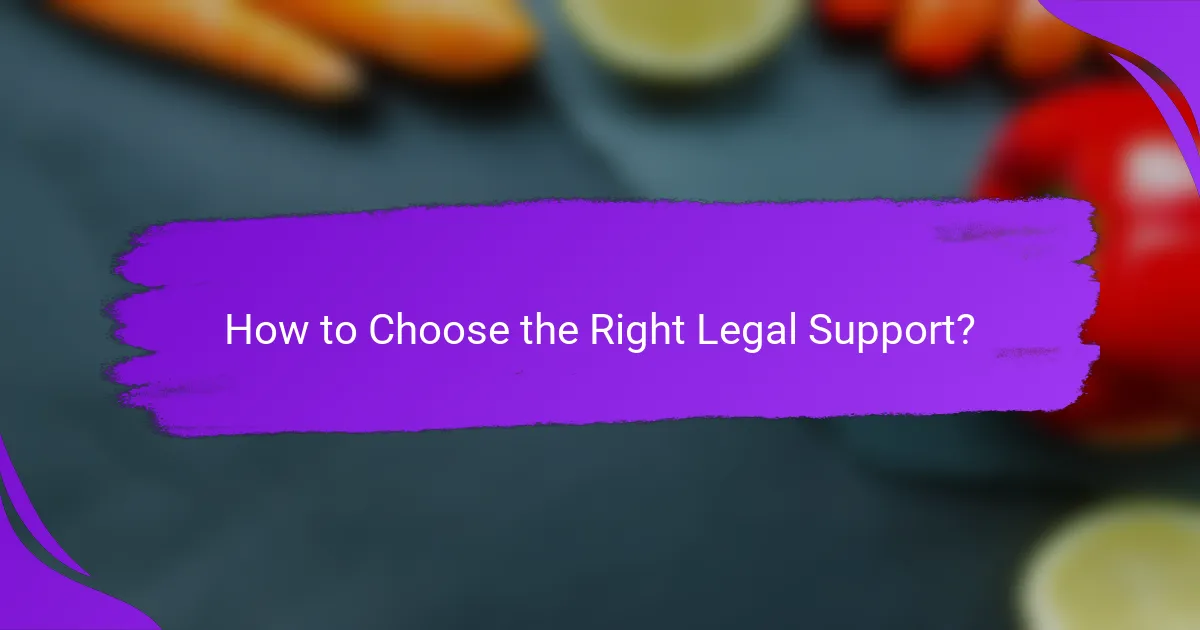
How to Choose the Right Legal Support?
Selecting the right legal support is crucial for media activists to navigate complex legal landscapes effectively. Consider your specific needs, the experience of potential legal advisors, and the associated costs to make an informed decision.
Assessing Needs
Begin by identifying the specific legal challenges you face as a media activist. This could range from issues related to copyright, defamation, or freedom of expression. Understanding your unique situation will help you find a legal expert with the right specialization.
Consider whether you need ongoing legal support or assistance for a particular case. For instance, if you are facing a lawsuit, you may require immediate representation, whereas general advice on media rights might only need periodic consultations.
Evaluating Experience
When evaluating potential legal support, prioritize candidates with a proven track record in media law. Look for attorneys who have successfully handled cases similar to yours, as their experience can significantly impact the outcome.
Check for credentials, such as membership in relevant legal associations or publications in media law journals. Additionally, client testimonials can provide insight into their effectiveness and approach to handling cases.
Understanding Costs
Legal fees can vary widely based on the complexity of your case and the attorney’s experience. It’s essential to discuss pricing structures upfront, which may include hourly rates, flat fees, or retainer agreements.
In the U.S., hourly rates for experienced media lawyers typically range from $200 to $600, while flat fees for specific services can be anywhere from a few hundred to several thousand dollars. Always request a detailed estimate to avoid unexpected expenses.
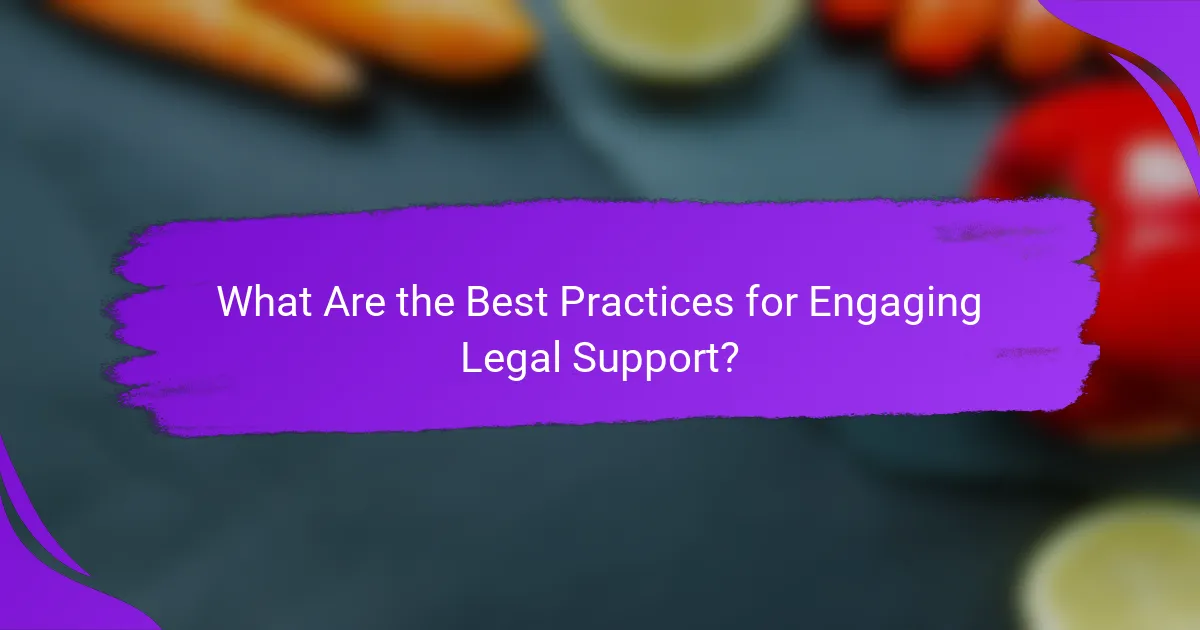
What Are the Best Practices for Engaging Legal Support?
Engaging legal support effectively involves clear communication, setting expectations, and maintaining regular updates. These practices ensure that media activists receive the necessary guidance while minimizing misunderstandings and enhancing collaboration.
Documenting Communications
Documenting communications with legal support is crucial for maintaining clarity and accountability. Keep records of all emails, phone calls, and meetings, noting key points and decisions made. This documentation can serve as a reference in case of disputes or misunderstandings.
Use a consistent format for documentation, such as a shared digital folder or a project management tool, to ensure easy access for all involved parties. This practice not only helps in tracking progress but also protects your rights as a media activist.
Setting Clear Expectations
Setting clear expectations from the outset is essential for a productive relationship with legal support. Clearly outline the scope of work, timelines, and deliverables to avoid confusion later on. Discuss any potential challenges and how they will be addressed.
Consider drafting a formal agreement that specifies roles, responsibilities, and payment terms. This can help prevent disputes and ensure that both parties are aligned on objectives and outcomes.
Regular Updates
Regular updates are vital for keeping all parties informed about the progress of legal matters. Schedule consistent check-ins, whether weekly or bi-weekly, to discuss developments and any changes in strategy. This practice fosters transparency and builds trust.
During updates, encourage open dialogue about any concerns or questions. This proactive communication can help identify issues early and allow for timely adjustments to your legal approach, ultimately benefiting your media activism efforts.

What Are the Emerging Trends in Legal Support for Media Activists?
Emerging trends in legal support for media activists include increased collaboration with legal organizations, the use of technology for legal education, and a growing emphasis on protecting digital rights. These trends reflect a shift towards more proactive and preventative legal strategies that empower activists in their work.
Increased Collaboration with Legal Organizations
Media activists are increasingly partnering with legal organizations to enhance their advocacy efforts. These collaborations often involve training sessions, legal workshops, and access to pro bono legal services, which can significantly bolster an activist’s ability to navigate legal challenges.
For example, initiatives like the Media Legal Defence Initiative provide resources and support to journalists facing legal threats. Such partnerships can help activists understand their rights and the legal frameworks that protect them, ultimately strengthening their impact.
Use of Technology for Legal Education
Technology is playing a crucial role in educating media activists about their legal rights and responsibilities. Online platforms and mobile applications are being developed to provide accessible legal information, making it easier for activists to stay informed about relevant laws and regulations.
Webinars and virtual workshops are becoming common, allowing activists to learn from legal experts regardless of their location. This trend not only democratizes access to legal knowledge but also fosters a community of informed activists who can share best practices and resources.
Emphasis on Protecting Digital Rights
As media activism increasingly occurs online, there is a heightened focus on protecting digital rights. Legal support now often includes guidance on issues such as data privacy, cybersecurity, and the implications of social media policies on free expression.
Activists are advised to stay updated on laws like the General Data Protection Regulation (GDPR) in Europe, which impacts how personal data is handled. Understanding these regulations helps activists safeguard their information and that of their sources, ensuring their work can continue without undue legal risk.


